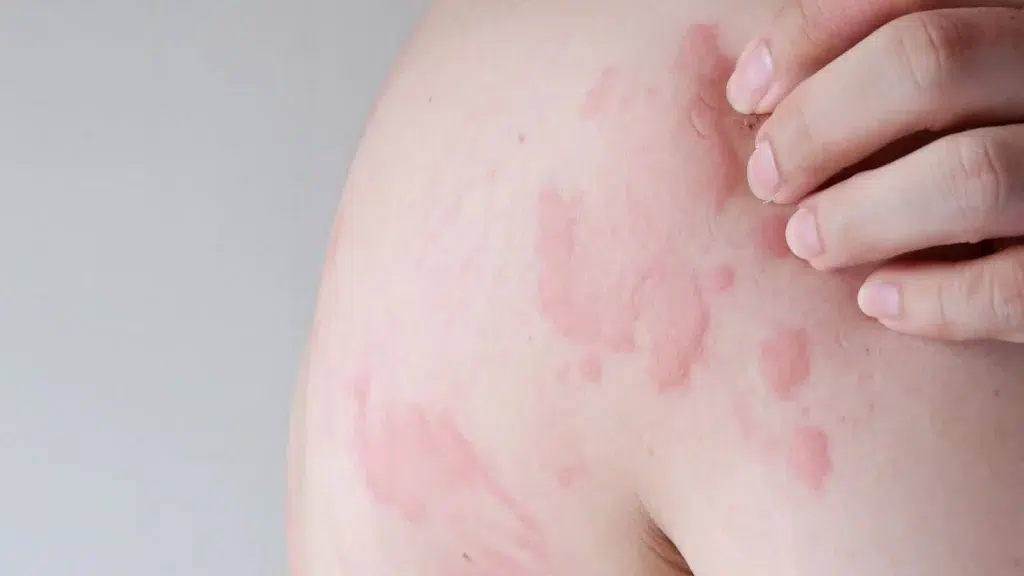Table of Contents
ToggleWhat Is Urticaria?
Urticaria, commonly known as hives, is a skin condition characterized by raised, itchy welts that can appear anywhere on the body. When these welts occur repeatedly for more than six weeks without a clear cause, the condition is referred to as chronic idiopathic urticaria. The word “idiopathic” means the cause is unknown. This form of urticaria can be frustrating for patients and physicians alike because it lacks an identifiable trigger.
Common Urticaria Symptoms to Watch For
- Red or skin-colored welts that vary in size and appear suddenly
- Severe itching, which may worsen at night
- Welts that fade in one area and emerge in another
- Swelling around the eyes, lips, hands, feet, or throat (angioedema) in some cases
These symptoms can flare up and disappear unpredictably. While each episode may last a few hours, chronic urticaria can persist for months or even years.
Exploring the Possible Causes of Urticaria Without a Trigger
Although the exact cause of chronic idiopathic urticaria is unknown, researchers believe it may be related to autoimmune dysfunction. In such cases, the body’s immune system mistakenly attacks healthy tissue, triggering the release of histamine and other chemicals that cause hives. Other possible contributing factors include:
- Stress or anxiety
- Infections (viral or bacterial)
- Hormonal imbalances
- Physical stimuli like pressure, heat, or cold
Even though pinpointing a cause can be difficult, understanding potential underlying factors helps guide treatment.
Different Types of Urticaria You Should Know
When exploring urticaria without cause, it’s important to understand the types of urticaria that may present similarly. These include:
- Chronic spontaneous urticaria (CSU): Occurs daily or almost daily for six weeks or more without an identifiable trigger
- Physical urticaria: Caused by physical factors like heat, cold, sunlight, or vibration
- Autoimmune urticaria: Involves an immune response that mistakenly attacks skin tissues
- Cholinergic urticaria: Triggered by sweating or increased body temperature
Each type requires a unique treatment plan. A proper diagnosis by a healthcare provider is essential to determine the best path forward.
Best Practices for Urticaria Treatment and Relief
While there’s no universal cure, urticaria treatment focuses on symptom management and reducing flare-ups. At Macie Medical, treatment plans are customized for each patient to improve comfort and quality of life. Common treatment strategies include:
- Antihistamines: These are the first line of defense. Non-drowsy, second-generation antihistamines like cetirizine or loratadine can block the histamine response and reduce itching
- H2 blockers: Sometimes used alongside antihistamines to enhance symptom relief
- Corticosteroids: Used for short periods during severe flare-ups
- Biologic therapy: Medications like omalizumab may be prescribed for patients with chronic spontaneous urticaria that does not respond to conventional treatments
- Lifestyle modifications: Avoiding known triggers, managing stress, and using gentle skin products can also help
If symptoms persist despite these treatments, it’s essential to seek medical guidance to explore other options.
When Should You See a Doctor for Urticaria?
If you experience chronic or recurrent hives that interfere with daily life or don’t respond to over-the-counter treatments, it’s time to consult a healthcare provider. You should also seek immediate medical attention if you experience symptoms like:
- Swelling in the throat or tongue
- Difficulty breathing
- Dizziness or rapid heartbeat
These could be signs of a more severe allergic reaction or underlying health issue.
Living with Chronic Idiopathic Urticaria
Urticaria without a known cause can be emotionally and physically draining. The unpredictability of flare-ups often leads to anxiety, sleep disturbances, and reduced quality of life. However, with proper treatment and regular care, most patients can manage their symptoms and lead full, active lives.
Macie Medical provides ongoing support and personalized treatment plans for individuals facing chronic urticaria. Whether your condition is mild or more complex, our experienced providers are here to guide you every step of the way.
Final Thoughts
Although urticaria without knowing the cause may seem overwhelming at first, many effective treatments are available. Understanding the urticaria symptoms, possible triggers, and treatment options empowers you to take control of your condition. At Macie Medical, we are committed to helping patients uncover the root of their symptoms and develop practical strategies for long-term relief.
Ready to take the next step? Schedule a consultation with our experienced care team to get personalized support for your skin health.
 Skip to content
Skip to content

